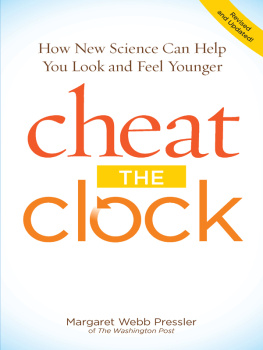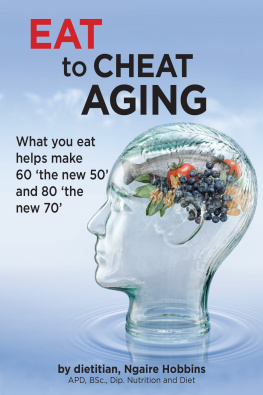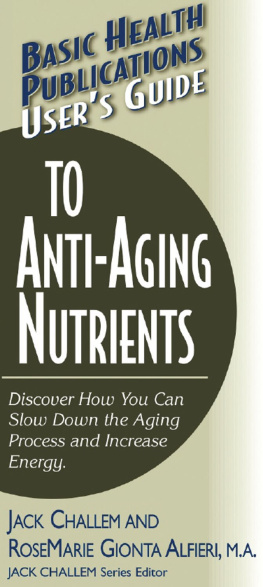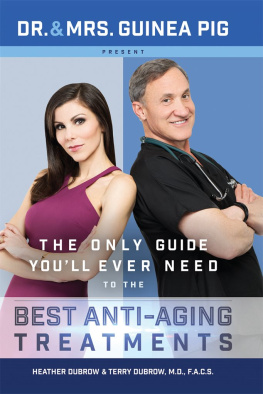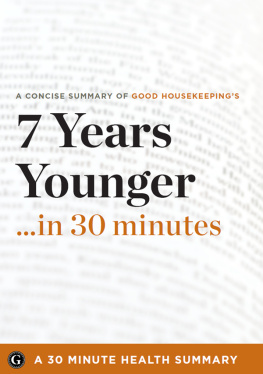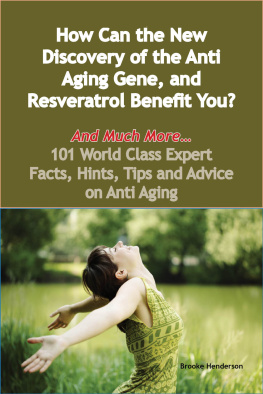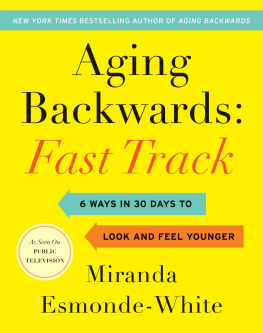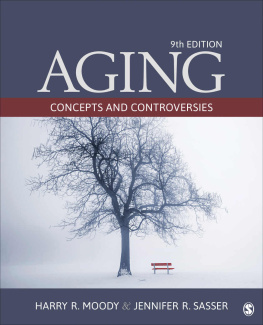An important and fascinating journey to answer one of lifes most mysterious questionswhy we age and how to do it well.
David A. Kessler, MD, former commissioner, U.S. Food and Drug Administration; author, The End of Overeating
A comprehensive look at what pertains to all of usthe science behind healthy aging.
Stephanie Lederman, executive director, American Federation for Aging Research
This book will likely inspire people from all over the world to take control of their health and the way they age.
Bahram H. Arjmandi, PhD, RD; chair, Department of Nutrition, Food, and Exercise Sciences; director, Center for Advancing Exercise and Nutrition Research on Aging, Florida State University
Margaret Pressler has found a fountain of youth in her own back-yard. By describing the simple ways that her husband has slowed the usual effects of aging, she provides an easy roadmap that readers can followfocusing on the basics of nutrition, exercise, sleep, and good health. Can there be anyone who wouldnt want to join the Presslers and Cheat the Clock?
David Ignatius, columnist, The Washington Post
For Eleanor, Phoebe, and William. The best.
ALPHA BOOKS
Published by Penguin Group (USA) Inc.
Penguin Group (USA) Inc., 375 Hudson Street, New York, New York 10014, USA Penguin Group (Canada), 90 Eglinton Avenue East, Suite 700, Toronto, Ontario M4P 2Y3, Canada (a division of Pearson Penguin Canada Inc.) Penguin Books Ltd., 80 Strand, London WC2R 0RL, England Penguin Ireland, 25 St. Stephens Green, Dublin 2, Ireland (a division of Penguin Books Ltd.) Penguin Group (Australia), 250 Camberwell Road, Camberwell, Victoria 3124, Australia (a division of Pearson Australia Group Pty. Ltd.) Penguin Books India Pvt. Ltd., 11 Community Centre, Panchsheel Park, New Delhi110 017, India Penguin Group (NZ), 67 Apollo Drive, Rosedale, North Shore, Auckland 1311, New Zealand (a division of Pearson New Zealand Ltd.) Penguin Books (South Africa) (Pty.) Ltd., 24 Sturdee Avenue, Rosebank, Johannesburg 2196, South Africa Penguin Books Ltd., Registered Offices: 80 Strand, London WC2R 0RL, England
Copyright 2013 by Margaret Webb Pressler
All rights reserved. No part of this book may be reproduced, scanned, or distributed in any printed or electronic form without permission. Please do not participate in or encourage piracy of copyrighted materials in violation of the authors rights. Purchase only authorized editions. No patent liability is assumed with respect to the use of the information contained herein. Although every precaution has been taken in the preparation of this book, the publisher and author assume no responsibility for errors or omissions. Neither is any liability assumed for damages resulting from the use of information contained herein. For information, address Alpha Books, 800 East 96th Street, Indianapolis, IN 46240.
ISBN: 978-1-61564-288-5
Library of Congress Catalog Card Number: 2013942518
15 14 13 8 7 6 5 4 3 2 1
Interpretation of the printing code: The rightmost number of the first series of numbers is the year of the books printing; the rightmost number of the second series of numbers is the number of the books printing. For example, a printing code of 13-1 shows that the first printing occurred in 2013.
Printed in the United States of America
Note: This publication contains the opinions and ideas of its author. It is intended to provide helpful and informative material on the subject matter covered. It is sold with the understanding that the author and publisher are not engaged in rendering professional services in the book. If the reader requires personal assistance or advice, a competent professional should be consulted.
The author and publisher specifically disclaim any responsibility for any liability, loss, or risk, personal or otherwise, which is incurred as a consequence, directly or indirectly, of the use and application of any of the contents of this book.
Trademarks: All terms mentioned in this book that are known to be or are suspected of being trademarks or service marks have been appropriately capitalized. Alpha Books and Penguin Group (USA) Inc. cannot attest to the accuracy of this information. Use of a term in this book should not be regarded as affecting the validity of any trademark or service mark.
Most Alpha books are available at special quantity discounts for bulk purchases for sales promotions, premiums, fund-raising, or educational use. Special books, or book excerpts, can also be created to fit specific needs. For details, write: Special Markets, Alpha Books, 375 Hudson Street, New York, NY 10014.
Publisher:Mike Sanders
Executive Managing Editor:Billy Fields
Executive Acquisitions Editor:Lori Cates Hand
Development Editors:Mark Reddin and Christy Wagner
Senior Production Editor:Janette Lynn
Cover/Book Designer:William Thomas
Indexer:Heather McNeill
Layout:Ayanna Lacey
Proofreader:Laura Caddell
Foreword
Aging is an inevitable process that involves an accumulation of changes to the human body over the course of ones lifetime. Its something many of us try to avoid, often through the use of cosmetics or surgery, but to no avail. Some people age gracefully and never appear to grow a day older, and some are not so lucky. But why is this? Is it that some have the gift of great genetics passed down from their parents? Or is it something else? Hippocrates (460377 B.C. ) once said Let food be thy medicine and medicine be thy food. While this statement was made thousands of years ago, it couldnt be closer to the truth, particularly with regard to aging.
I started my work in the field of aging more than two decades ago as a fellow of the American Institute on Aging. Since that time, I have conducted numerous studies looking at the health benefits of dietary factors on human health. I was amongst the first to show that estrogen and estrogen-like compounds from plants can enhance intestinal calcium absorption; that soy protein may alleviate the symptoms of osteoarthritis; that regular consumption of flaxseed not only lowers cholesterol but more importantly, prevents the formation of fatty lesions, the culprit of arterial plaques; that consumption of a couple apples per day can lower bad cholesterol by 23 percent in a few months; and that the incorporation of a few prunes into our daily diet not only can prevent bone loss but more amazingly can bring back the bone we have already lost.
Fortunately, in recent years, the American Medical Association has stocked all its journals, including its flagship, JAMA (Journal of the American Medical Association), with articles on such alternative remedies. And though several techniques have withered under scientific scrutiny, others have emerged looking better than mainstream treatments. Hence, isnt it time to change our usual view of medicine as the cultural equivalent of George Washington, while the typical opinion of nutritional intervention is equated with that of Rodney Dangerfield? It is not naive to offer a simple solution to a complex condition. These simple remedies are not really that simple when practiced for an extended period of time. Next time, instead of having an ice cream, try to have a few wedges of watermelon; eat a couple apples or a few ounces of prunes instead of popcorn with added fat; try not to find the closest parking spot when you go to work or shopping; and try to take the stairs instead of the elevator when feasible. Do these things from this day onward, and see the results for yourself.

